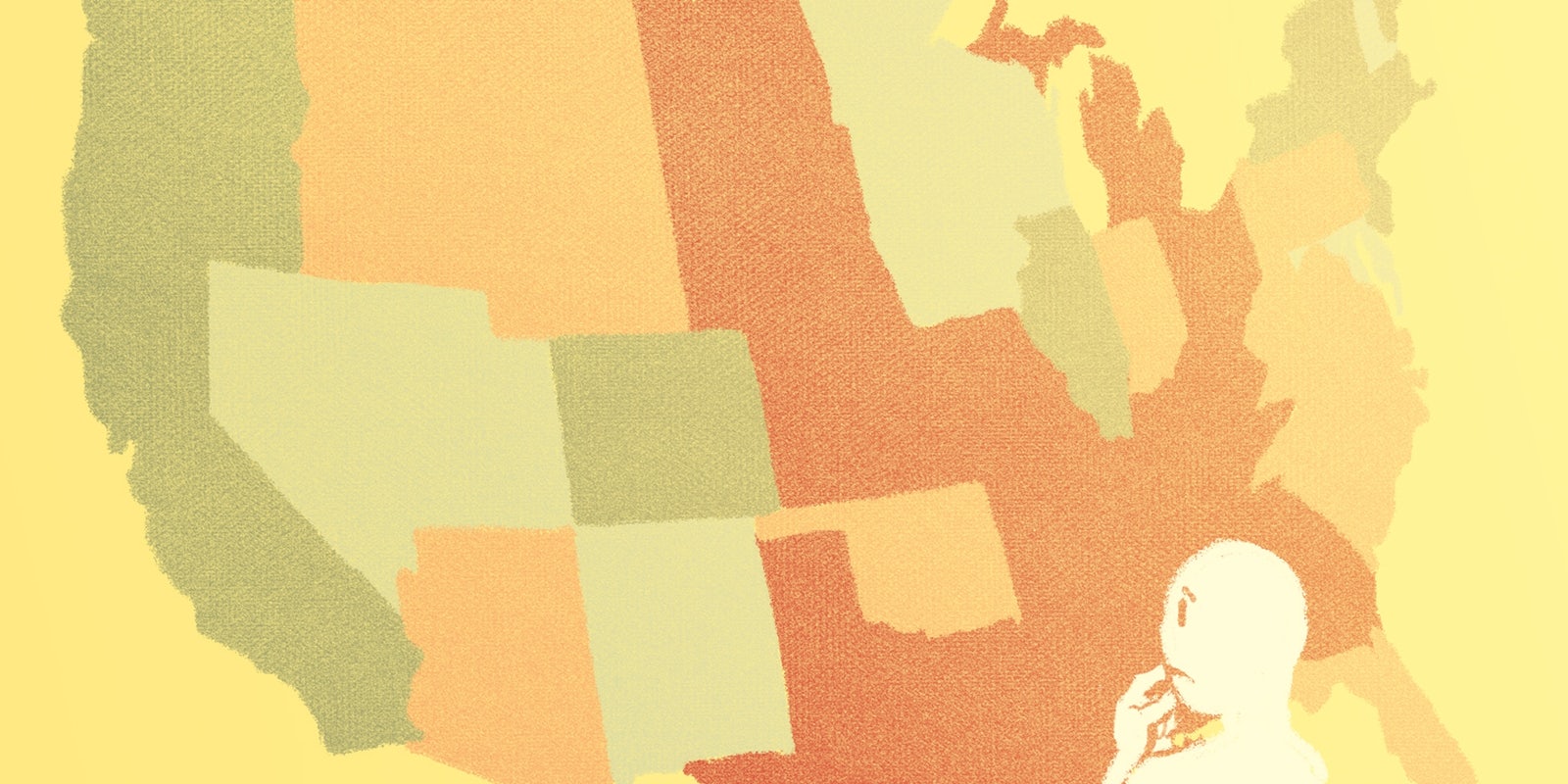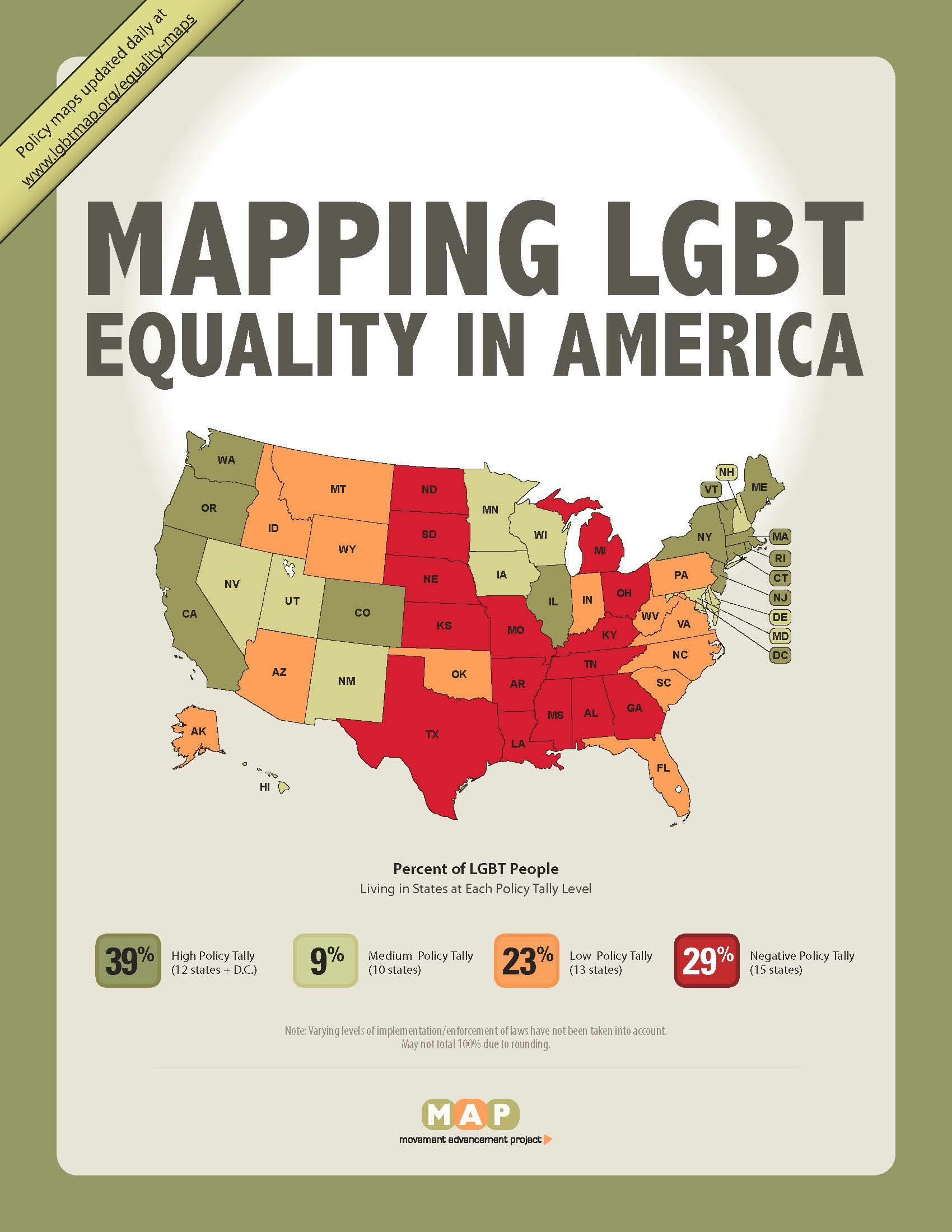Caitlyn Jenner‘s explosive introduction to the world on Monday resulted in millions of tweets, posts, and op-eds about how gorgeous she looked. The congratulations poured in from celebrities, and Jenner even beat President Obama‘s record for most Twitter followers in the shortest amount of time. But the flurry of chatter about Jenner’s new name and high-femme look on the cover of Vanity Fair left something to be desired.
We forgot to talk about the lack of civil rights that still faces transgender people across the majority of U.S. states.
A wealthy retired Olympian-turned-reality star like Jenner can not only afford what many have presumed to be several surgical procedures during transition, but also to live in a state (California) with a relatively high policy score when it comes to transgender equality.
Only 19 states and the District of Columbia offer trans residents full non-discrimination protection under the law when it comes to employment, for example. A whopping 28 states have zero laws on the books addressing employment discrimination based on gender identity, according to the Transgender Law Center. In 2012, federal Title VII protections against sex discrimination in employment were expanded to include gender identity, but the difference between fighting discrimination using state and federal law is significant.
In a new article in the Guardian, trans feminist writer Meredith Talusan questions the way the public is talking about Caitlyn Jenner by focusing primarily on her looks.
“While I welcome all the positive affirmation of Caitlyn Jenner’s gender identity, it’s important to not forget how the forces of economic privilege and beauty standards affect most trans women,” wrote Talusan. “Understanding of the economic conditions required to transition with such aplomb were echoed by a number of other trans women on my social media feeds, even those who celebrate her visibility: We all know too well how difficult and expensive it is to be a certain kind of pretty.”
Jenner is inarguably doing much to advance transgender rights and public perception just by virtue of being out. But Jenner is also rich, Republican, and internationally famous. The majority of transgender people struggle. According to the National Center for Transgender Equality, trans people are four times as likely to live in poverty, make less than $10,000 a year, and they face rates of violence and suicide that are drastically higher than those facing the general population. There’s a lot more to being transgender than looks.
So now that Jenner is fully out and helping to transform the nation’s understanding of transgender issues, how far is there left to go? According to the Transgender Law Center, there are 24 US states receiving “negative” policy scores when it comes to laws pertaining to gender identity and expression.
But trans rights also tend to overlap with policies affecting all LGBT people, such as safe schools, healthcare access, adoption, and parenting laws, and recognition of relationship status (same-sex marriage bans can affect trans people who haven’t met the requirements for changing gender on legal documents). It’s a complex mixture of LGBT-friendly policies that determines the best and worst places to live, and the results can be surprising. Who would have thought that cities in South Carolina, from a state policy perspective, would be more LGBT-friendly than Detroit, New Orleans, or Austin?
Here’s a full state-by-state breakdown of the 15 U.S. states scored lowest for LGBT rights, and why. (Listed alphabetically.)
- Alabama: Lacks anti-discrimination laws pertaining to housing, employment, adoption, or schools. Has a religious-exemption law that allows discrimination based on religious beliefs. Has a “don’t say gay” law banning educators from discussing LGBT people or issues in schools. Allows conversion therapy for LGBT youth.
-
Arkansas: Lacks anti-discrimination laws pertaining to housing, employment, adoption, or schools. Does have anti-bullying law in place protecting LGBT students. Allows conversion therapy for LGBT youth.
-
Georgia: Lacks anti-discrimination laws pertaining to housing, employment, adoption, or schools. Has state ban on same-sex marriage and relationship recognition. Allows conversion therapy for LGBT youth. Does have anti-bullying law in place protecting LGBT students.
-
Kansas: Lacks anti-discrimination laws pertaining to housing, employment, adoption, or schools. Has a religious-exemption law that allows discrimination based on religious beliefs. Has state ban on same-sex marriage and relationship recognition. Bans same-sex couples from adopting. Allows conversion therapy for LGBT youth.
-
Kentucky: Lacks anti-discrimination laws pertaining schools. Does have state anti-discrimination protections based on employment, housing, and public accommodations. Has a religious-exemption law that allows discrimination based on religious beliefs. Has state ban on same-sex marriage and relationship recognition. Bans same-sex couples from adopting. Allows conversion therapy for LGBT youth.
-
Louisiana: Lacks anti-discrimination laws pertaining to housing, employment, adoption, or schools. Has a religious-exemption law that allows discrimination based on religious beliefs. Has state ban on same-sex marriage and relationship recognition. Has a “don’t say gay” law banning educators from discussing LGBT people or issues in schools. Bans same-sex couples from adopting. Allows conversion therapy for LGBT youth.
-
Michigan: Lacks anti-discrimination laws pertaining to housing, employment, adoption, or schools. Has state ban on same-sex marriage and relationship recognition. Bans same-sex couples from adopting. Allows conversion therapy for LGBT youth.
-
Mississippi: Lacks anti-discrimination laws pertaining to housing, employment, adoption, or schools. Has a religious-exemption law that allows discrimination based on religious beliefs. Has state ban on same-sex marriage and relationship recognition. Has a “don’t say gay” law banning educators from discussing LGBT people or issues in schools. Bans same-sex couples from adopting. Allows conversion therapy for LGBT youth.
-
Missouri: Lacks anti-discrimination laws pertaining to housing, employment, adoption, or schools. Has a religious-exemption law that allows discrimination based on religious beliefs. Has state ban on same-sex marriage and relationship recognition. Allows conversion therapy for LGBT youth.
-
Nebraska: Lacks anti-discrimination laws pertaining to housing, employment, adoption, or schools. Has state ban on same-sex marriage and relationship recognition. Bans same-sex couples from adopting. Allows conversion therapy for LGBT youth.
-
North Dakota: Lacks anti-discrimination laws pertaining to housing, employment, adoption, or schools. Has state ban on same-sex marriage and relationship recognition. Allows conversion therapy for LGBT youth.
-
Ohio: Lacks anti-discrimination laws pertaining to housing, employment, adoption, or schools. Has state ban on same-sex marriage and relationship recognition. Bans same-sex couples from adopting. Allows conversion therapy for LGBT youth.
-
South Dakota: Lacks anti-discrimination laws pertaining to housing, employment, adoption, or schools. Has state ban on same-sex marriage and relationship recognition. Allows conversion therapy for LGBT youth. Has state ban on local schools and districts passing anti-discrimination laws for LGBT students.
-
Tennessee: Lacks anti-discrimination laws pertaining to housing, employment, adoption, or schools. Has a religious-exemption law that allows discrimination based on religious beliefs. Has state ban on same-sex marriage and relationship recognition. Has state ban preventing cities and counties from passing non-discrimination laws for LGBT citizens. Allows conversion therapy for LGBT youth.
-
Texas: Lacks anti-discrimination laws pertaining to housing, employment, adoption, or schools. Has a religious exemption law that allows discrimination based on religious beliefs. Has state ban on same-sex marriage and relationship recognition. Has a “don’t say gay” law banning educators from discussing LGBT people or issues in schools. Allows conversion therapy for LGBT youth.
Illustration by Max Fleishman

